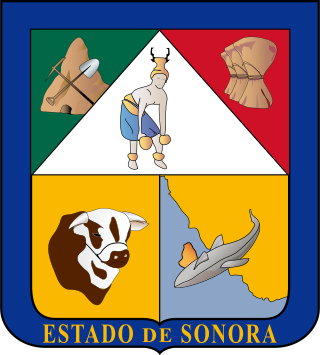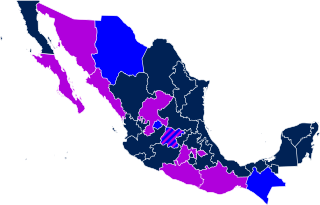
The United Mexican States is a federal republic composed of 32 federal entities: 31 states and Mexico City, an autonomous entity. According to the Constitution of 1917, the states of the federation are free and sovereign in all matters concerning their internal affairs. Each state has its own congress and constitution.

The Honorable Congress of the State of Nuevo León is the unicameral legislature of the government of the Mexican state of Nuevo León. Each three-year legislative term consists of 42 deputies, with 26 elected through relative majority and 16 through proportional representation.

The Congress of the State of Jalisco is the legislative branch of the government of the State of Jalisco. It was constituted for the first time after the independence of Mexico on September 8, 1823. Having its first session on September 14 of the same year. The Congress is the governmental deliberative body of Jalisco, which is equal to, and independent of, the executive.

The Honorable Congress of the State of Sonora is the legislative branch of the government of the Mexican state of Sonora. The Congress is the governmental deliberative body of Sonora, which is equal to, and independent of, the executive.

The Congress of the State of Colima, or simply Congress of Colima, is the legislative branch of the government of the State of Colima. The Congress of Colima is a unicameral legislature.

Lesbian, gay, bisexual, transgender and queer (LGBTQ) rights in Mexico expanded in the 21st century, keeping with worldwide legal trends. The intellectual influence of the French Revolution and the brief French occupation of Mexico (1862–67) resulted in the adoption of the Napoleonic Code, which decriminalized same-sex sexual acts in 1871. Laws against public immorality or indecency, however, have been used to prosecute persons who engage in them.

The Honorable Congress of the State of Tabasco is the legislative branch of the government of the State of Tabasco. The Congress is the governmental deliberative body of Tabasco, which is equal to, and independent of, the executive. It is located in front of the Plaza de Armas, in the historic center of the city of Villahermosa, capital of the state.

Same-sex marriage is legally recognized and performed throughout Mexico since 2022. On 10 August 2010 the Supreme Court of Justice of the Nation ruled that same-sex marriages performed anywhere within Mexico must be recognized by the 31 states without exception, and fundamental spousal rights except for adoption have also applied to same-sex couples across the country. Mexico was the fifth country in North America and the 33rd worldwide to allow same-sex couples to marry nationwide.
Most Mexican states do not have an official flag. For these states, a de facto flag is used for civil and state purposes. State flags of Mexico have a 4:7 ratio and typically consist of a white background charged with the state's coat of arms.
The Congress of the State of Coahuila de Zaragoza is the state legislature of Coahuila, a state of Mexico. The Congress is unicameral.

The Congress of the State of Michoacán is the state legislature of Michoacán, a state of Mexico. The Congress is unicameral.

The Congress of the State of Oaxaca is the legislature of Oaxaca, a state of Mexico. The Congress is unicameral.

The Honorable Congress of the State of Puebla is the legislative branch of the government of the State of Puebla. It was constituted for the first time after the independence of Mexico on January 1, 1826. The Congress is the governmental deliberative body of Puebla, which is equal to, and independent of, the executive. The Congress is unicameral.

The Honorable Congress of the Free and Sovereign State of Quintana Roo, or simply Congress of the State of Quintana Roo, is the legislature of Quintana Roo, a state of Mexico. The Congress is unicameral.
The Congress of the State of Durango is the unicameral legislative branch of the government of the Mexican State of Durango. The Congress is the governmental deliberative body of Durango, which is equal to, and independent of, the executive.

The Congress of Aguascalientes or by its full name Congress of the Free and Sovereign State of Aguascalientes is the depository body of the legislative power of the Mexican state of Aguascalientes, It is a unicameral assembly made up of twenty-seven deputies, of whom eighteen are elected by relative majority and nine by proportional representation.
Same-sex marriage has been legal in Tamaulipas since 19 November 2022. On 26 October 2022, the Congress of Tamaulipas passed a bill to legalize same-sex marriage in a 23–12 vote. It was published in the official state journal on 18 November, and took effect the following day. Tamaulipas was the second-to-last Mexican state to legalize same-sex marriage.

Brenda Georgina Cárdenas Thomae is a Mexican politician and lawyer. She has served as the Congresswoman for Nuevo Laredo District 2 at the Congress of Tamaulipas, associated with the National Action Party (PAN), and as Director of the Tamaulipas Migrants Institute state agency. She also ran as a councilwoman of Nuevo Laredo municipal government.















